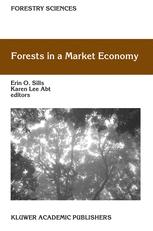

Most ebook files are in PDF format, so you can easily read them using various software such as Foxit Reader or directly on the Google Chrome browser.
Some ebook files are released by publishers in other formats such as .awz, .mobi, .epub, .fb2, etc. You may need to install specific software to read these formats on mobile/PC, such as Calibre.
Please read the tutorial at this link: https://ebookbell.com/faq
We offer FREE conversion to the popular formats you request; however, this may take some time. Therefore, right after payment, please email us, and we will try to provide the service as quickly as possible.
For some exceptional file formats or broken links (if any), please refrain from opening any disputes. Instead, email us first, and we will try to assist within a maximum of 6 hours.
EbookBell Team

4.1
40 reviewsThis book draws together contributions from forest economists in the Research Triangle of North Carolina, with co-authors from institutions around the world. It represents our common belief that rigorous empirical analysis in an economic framework can inform forest policy. We intend the book as a guide to the empirical methods that we have found most useful for addressing both traditional and modem areas of concern in forest policy, including timber production and markets, multiple use forestry, and valuation of non-market benefits. 'The book editors and most chapter authors are affiliated with three institutions in the Research Triangle: the Southern Research Station of the USDA Forest Service (K. Abt, Butry, Holmes, Mercer, Moulton, Prestemon, Wear), the Department of Forestry at North Carolina State University (R. Abt, Ahn, Cubbage, Sills), and the Environmental and Natural Resource Economics Program of Research Triangle Institute (Murray, Pattanayak). Two other Triangle institutions are also represented among the book authors: Duke University (Kramer) and the Forestland Group (Zinkhan). In addition to our primary affiliations, many of us are adjunct faculty and/or graduates of Triangle universities. Many of our co-authors also graduated from or were previously affiliated with Triangle institutions. Thus, the selection of topics, methods, and case studies reflects the work of this particular network of economists, and to some degree, our location in the southeastern United States. However, our work and the chapters encompass other regions of the United States and the world, including Latin America and Asia.